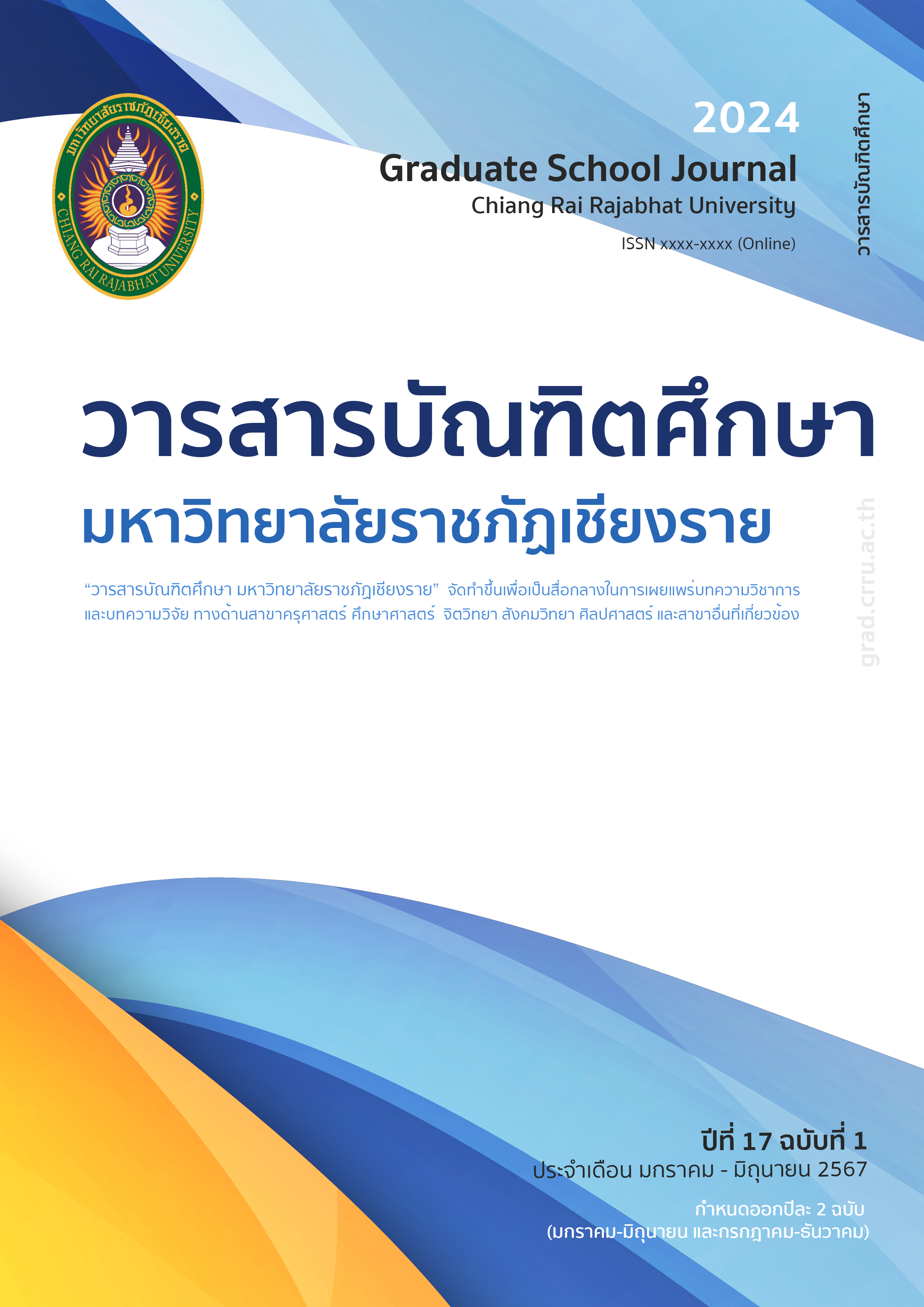ภาวะผู้นำเชิงรุกของผู้บริหารที่ส่งผลต่อประสิทธิผลของโรงเรียน สังกัดสำนักงานเขตพื้นที่การศึกษามัธยมศึกษาสกลนคร
Main Article Content
บทคัดย่อ
บทความวิจัยนี้มีวัตถุประสงค์เพื่อศึกษา 1) องค์ประกอบภาวะผู้นำเชิงรุกของผู้บริหาร
2) ระดับภาวะผู้นำเชิงรุกของผู้บริหาร และระดับประสิทธิผลของโรงเรียน 3) ความสัมพันธ์ระหว่างภาวะผู้นำเชิงรุกของผู้บริหารกับประสิทธิผลของโรงเรียน 4) อำนาจพยากรณ์ของภาวะผู้นำเชิงรุกของผู้บริหารที่ส่งผลต่อประสิทธิผลของโรงเรียน และ 5) แนวทางการพัฒนาภาวะผู้นำเชิงรุกของผู้บริหารที่ส่งผลต่อประสิทธิผลของโรงเรียน สังกัดสำนักงานเขตพื้นที่การศึกษามัธยมศึกษาสกลนคร วิธีดำเนินการวิจัย แบ่งออกเป็น 3 ระยะ ได้แก่ 1) ศึกษาองค์ประกอบของภาวะผู้นำเชิงรุกของผู้บริหาร 2) ศึกษาภาวะผู้นำเชิงรุกของผู้บริหารที่ส่งผลต่อประสิทธิผลของโรงเรียน สังกัดสำนักงานเขตพื้นที่การศึกษามัธยมศึกษาสกลนคร และ 3) ศึกษาแนวทางการพัฒนาภาวะผู้นำเชิงรุกของผู้บริหารที่ส่งผลต่อประสิทธิผลของโรงเรียน สังกัดสำนักงานเขตพื้นที่การศึกษามัธยมศึกษาสกลนคร
จากการศึกษาองค์ประกอบภาวะผู้นำเชิงรุกของผู้บริหาร พบว่า มี 5 องค์ประกอบ ได้แก่ 1) การมีความมุ่งมั่นที่เป็นอิสระ 2) การรู้จักตนเอง 3) การมีจินตนาการ 4) การมีวิจารณญาณ และ 5) การวางแผนการทำงาน ระดับภาวะผู้นำเชิงรุกของผู้บริหาร สังกัดสำนักงานเขตพื้นที่การศึกษามัธยมศึกษาสกลนคร โดยรวม อยู่ในระดับมาก ส่วนระดับประสิทธิผลของโรงเรียน สังกัดสำนักงานเขตพื้นที่การศึกษามัธยมศึกษาสกลนคร โดยรวมอยู่ในระดับมากที่สุด เมื่อศึกษาความสัมพันธ์ระหว่างภาวะผู้นำเชิงรุกของผู้บริหารกับประสิทธิผลของโรงเรียนนั้น มีความสัมพันธ์กันทางบวกในระดับสูง และอำนาจพยากรณ์ภาวะผู้นำเชิงรุกของผู้บริหารที่ส่งผลต่อประสิทธิผลของโรงเรียน อย่างมีนัยสำคัญทางสถิติที่ระดับ .01 คือ การมีจินตนาการ และการมีวิจารณญาณ ส่วนการรู้จักตนเอง สามารถพยากรณ์ประสิทธิผลของโรงเรียน สังกัดสำนักงานเขตพื้นที่การศึกษามัธยมศึกษาสกลนคร
ได้อย่างมีนัยสำคัญทางสถิติที่ระดับ .05 โดยมีอำนาจพยากรณ์ร้อยละ 77.10
แนวทางการพัฒนาภาวะผู้นำเชิงรุกของผู้บริหารที่ส่งผลต่อประสิทธิผลของโรงเรียน สังกัดสำนักงานเขตพื้นที่การศึกษามัธยมศึกษาสกลนคร มีจำนวน 3 ด้าน คือ ด้านการมีจินตนาการ ด้านการมีวิจารณญาณ และด้านการรู้จักตนเอง
Article Details

อนุญาตภายใต้เงื่อนไข Creative Commons Attribution-NonCommercial-NoDerivatives 4.0 International License.
บทความที่ได้รับการตีพิมพ์เป็นลิขสิทธิ์ของวารสารมหาวิทยาลัยราชภัฎเชียงราย
ข้อความที่ปรากฏในบทความแต่ละเรื่องในวารสารวิชาการเล่มนี้เป็นความคิดเห็นส่วนตัวของผู้เขียนแต่ละท่านไม่เกี่ยวข้องกับมหาวิทยาลัยราชภัฎเชียงราย และคณาจารย์ท่านอื่นๆในมหาวิทยาลัยฯ แต่อย่างใด ความรับผิดชอบองค์ประกอบทั้งหมดของบทความแต่ละเรื่องเป็นของผู้เขียนแต่ละท่าน หากมีความผิดพลาดใดๆ ผู้เขียนแต่ละท่านจะรับผิดชอบบทความของตนเองแต่ผู้เดียว
เอกสารอ้างอิง
กระทรวงศึกษาธิการ. (2551). หลักสูตรแกนกลางการศึกษาขั้นพื้นฐานพุทธศักราช 2551. กรุงเทพฯ: กระทรวงศึกษาธิการ.
กีรติ ภู่ทอง. (2558). ภาวะผู้นำเชิงรุกของผู้บริหารโรงเรียนที่ส่งผลต่อคุณภาพผู้เรียนของโรงเรียนขยายโอกาสทางการศึกษาขนาดใหญ่ สังกัดสำนักงานเขตพื้นที่การศึกษาประถมศึกษาปทุมธานี เขต 1. (วิทยานิพนธ์ศึกษาศาสตรมหาบัณฑิต). มหาวิทยาลัยบูรพา. ชลบุรี.
ดารารัตน์ จันทร์กาย. (2559). สมรรถนะของผู้บริหารสถานศึกษาสังกัดสำนักงานเขตพื้นที่การศึกษาประถมศึกษาอุตรดิตถ์ในทศวรรษหน้า (พ.ศ. 2558 - 2567). (วิทยานิพนธ์ศึกษาศาสตรมหาบัณฑิต). มหาวิทยาลัยราชภัฏอุตรดิตถ์. อุตรดิตถ์.
พรวิทย์ พัชรินทร์ตนะกุล. (2562). Disrupt สถานศึกษาต้องมองไปข้างหน้า. สืบค้นจาก https://thestandard.co/panyapiwat-institute-of-management/
พระมหาสัณทยา ธีรธารี. (2556). ภาวะผู้นำตามหลักสัปปุริสธรรม 7 ในการพัฒนาองค์การของนายกเทศมนตรี เทศบาลตำบลหนองสอ อำเภอเมือง จังหวัดกาฬสินธุ์. (วิทยานิพนธ์พุทธศาสตรมหาบัณฑิต). มหาวิทยาลัยมหาจุฬาลงกรณราชวิทยาลัย. กรุงเทพฯ.
ภรณี มหานนท์. (2554). การประเมินประสิทธิผลขององค์การ. กรุงเทพฯ: โอเดียนสโตร์.
วาโร เพ็งสวัสดิ์. (2551). วิธีวิทยาการวิจัย. กรุงเทพฯ: สุวีริยาสาส์น.
วุฒิชัย โภคะชัย. (2564). ความสัมพันธ์ระหว่างความพึงพอใจในการปฏิบัติงานของครูผู้สอนกับประสิทธิผลของโรงเรียน สังกัดสำนักงานเขตพื้นที่การศึกษามัธยมศึกษา เขต 23. วารสารการบริหารการศึกษาและภาวะผู้นำ มหาวิทยาลัยราชภัฏสกลนคร, 10(38), 12-20.
วิฑูรย์ สิมะโชคดี. (2563). การพัฒนาทรัพยากรมนุษย์. กรุงเทพฯ: เนตรนิมิตการพิมพ์.
สงกรานต์ จิตสุทธิภากร. (2541). 7 อุปนิสัยพัฒนาสู่ผู้มีประสิทธิผลสูง (The 7 habits of highly effective People). กรุงเทพฯ: ซีเอ็ดยูเคชั่น.
สำนักงานเขตพื้นที่การศึกษามัธยมศึกษาสกลนคร. (2565). ข้อมูลอัตรากำลังข้าราชการครูและบุคลากรทางการศึกษา สพม.สกลนคร. สืบค้นจาก https://www.sesaosakon.go.th/web2023/
สุชีรา จันทพรม. (2553). การศึกษาอิทธิพลภาวะผู้นำเชิงรุกของผู้บริหารที่ส่งผลต่อคุณภาพผู้เรียนของโรงเรียน สังกัดสำนักงานเขตพื้นที่การศึกษายโสธร. (วิทยานิพนธ์ศึกษาศาสตรมหาบัณฑิต). มหาวิทยาลัยบูรพา. ชลบุรี.
อมรรัตน์ เตชะนอก (2563). การบริหารสถานศึกษาสู่ความเป็นเลิศในศตวรรษที่ 21 (Education management towards excellence in the 21st century). Journal of Modern Learning Development, 5(6), 21-24.
อรอุมา ไมยวงค์. (2564). ปัจจัยการบริหารที่ส่งผลต่อประสิทธิผลของโรงเรียนขนาดเล็ก สังกัดสำนักงานเขตพื้นที่การศึกษาประถมศึกษาในจังหวัดนครพนม. (วิทยานิพนธ์ศึกษาศาสตรมหาบัณฑิต). มหาวิทยาลัยราชภัฏสกลนคร. สกลนคร.
Covey, S.R. (1989). The 7 Habits of Highly Effective People. New York: Simon & Schuster. Inc.
Krejcie, R. V. & Morgan, D. W. (1970). Determining Sample Size for Research Activities. Educational and Psychological Measurement, 30(3), 607-610.


